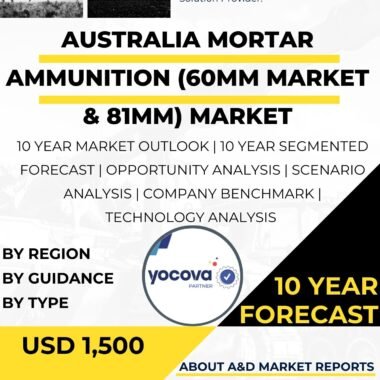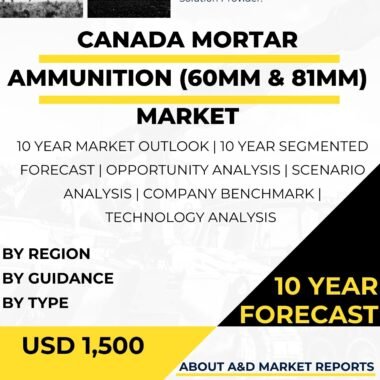Description
UK Mortar Ammunition Market Overview
The United Kingdom mortar ammunition market, covering 60mm and 81mm rounds, plays a vital role in strengthening the nation’s defense capabilities. Mortar ammunition supports infantry units by providing indirect firepower across short and medium ranges. These systems are widely used in conventional warfare, peacekeeping missions, and counterinsurgency operations. The UK actively develops, produces, and exports mortar ammunition to meet domestic military needs and allied requirements. Continuous modernization ensures compatibility with modern battlefield systems. This market remains essential for operational flexibility and tactical superiority.
Historical Development of the UK Mortar Ammunition Market
The UK mortar ammunition market originated during World War I and expanded rapidly during World War II. Mortars proved effective in engaging hidden and fortified enemy positions. Early designs focused on simplicity and rapid deployment. Over time, battlefield experience drove improvements in range, accuracy, and explosive effectiveness. Cold War developments further enhanced standardization and reliability. These historical advancements laid the foundation for today’s advanced mortar systems.
Key Players in the UK Mortar Ammunition Market
The Ministry of Defence plays a central role in overseeing requirements and procurement. Major defense manufacturers handle large-scale production and system integration. Specialized ammunition suppliers focus on fuze systems, propellants, and warhead design. Research institutions contribute testing and validation expertise. Close cooperation between industry and the armed forces ensures continuous improvement. This integrated ecosystem supports both domestic readiness and export demand.
Technological Advancements in the UK Mortar Ammunition Market
Technology has significantly improved the effectiveness of UK mortar ammunition. Advanced propellant formulations increase range consistency and reliability. Aerodynamic enhancements improve flight stability and accuracy. Modern fuze technologies allow programmable detonation modes. Precision-guided mortar rounds reduce collateral damage and increase mission success. These advancements enhance survivability and effectiveness for ground forces.
International Collaboration in the UK Mortar Ammunition Market
International cooperation strengthens the UK mortar ammunition market. Joint research programs support shared innovation and cost efficiency. Allied partnerships improve interoperability during combined operations. Export collaboration helps expand production volumes and market reach. Knowledge exchange accelerates technology development. These partnerships reinforce the UK’s position in global defense supply chains.
Policy and Regulation in the UK Mortar Ammunition Market
Strict national and international regulations govern the UK mortar ammunition market. Policies ensure safe production, storage, and transportation. Export controls align with international arms treaties and ethical standards. Regulatory oversight maintains quality and operational reliability. Compliance builds trust with global partners. Strong governance supports sustainable market growth.
Future Outlook for the UK Mortar Ammunition Market
The UK mortar ammunition market is expected to grow steadily. Evolving security threats increase demand for modern indirect fire solutions. Ground force modernization programs will drive new procurement. Ammunition must integrate with digital fire control systems. Competition from global suppliers is increasing. Continuous innovation will be critical to maintain market leadership.
Conclusion
The UK mortar ammunition market, covering 60mm and 81mm rounds, remains essential to national defense capability. Its strength lies in historical experience, advanced technology, and skilled industry players. International partnerships and strong policies support long-term stability. Ongoing investment in innovation will enhance operational effectiveness. The market will continue to support both national security and global defense cooperation.




